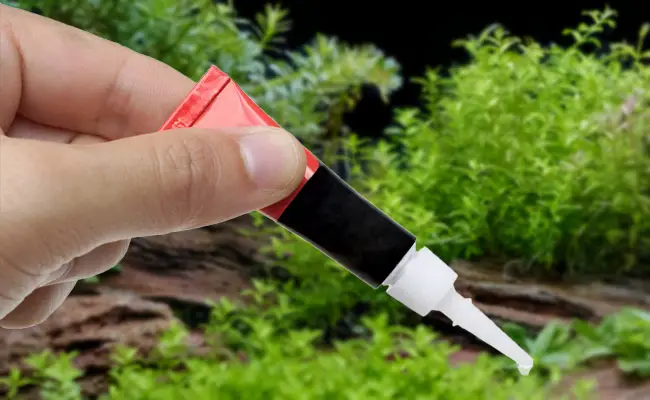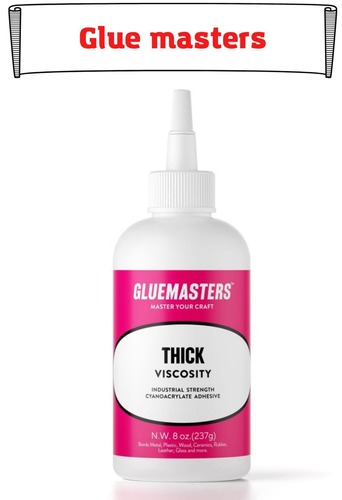Are you considering using Elmer’s glue in your aquarium? While it may seem like a quick and easy solution for repairing decorations or attaching plants, it’s important to consider the potential risks involved. In this article, we’ll explore the safety of using Elmer’s glue in your aquarium and offer some alternative solutions to ensure the health and well-being of your aquatic pets. So, before you reach for that bottle of glue, read on to learn more about this controversial topic.
Using Elmer’s glue in your aquarium may not be safe for your fish and other aquatic life. The glue contains chemicals that can harm them and alter the water chemistry. Instead, use aquarium-safe silicone sealants or epoxy for repairs and decorations. These products are specifically designed for use in aquariums and are non-toxic to aquatic life. Always read the labels and follow the instructions carefully before using any product in your aquarium.

Using Elmer’s Glue in Your Aquarium: Is It Safe?
Elmer’s glue is a popular adhesive used in many different applications, including aquariums. However, before using this glue in your aquarium, it is important to understand the potential risks and benefits. In this article, we will explore the safety of using Elmer’s glue in your aquarium and provide you with useful tips to ensure your aquarium remains safe and healthy for your aquatic pets.
What is Elmer’s Glue and How it Works?
Elmer’s glue is a popular brand of white glue that is commonly used in arts and crafts, woodworking, and other applications. It is a water-based adhesive that is made from polyvinyl acetate (PVA) and has a mild, pleasant odor. When applied, the glue dries clear and creates a strong, durable bond.
In an aquarium setting, Elmer’s glue is often used to attach live plants and coral fragments to rocks or other surfaces. The glue can also be used to repair small cracks or holes in aquarium decorations and equipment. It is important to note that not all types of Elmer’s glue are safe for use in aquariums, so be sure to read the label carefully before using.
Benefits of Using Elmer’s Glue in Your Aquarium
One of the main benefits of using Elmer’s glue in your aquarium is that it is a safe and effective way to attach live plants or coral fragments to rocks or other surfaces. Unlike other adhesives that contain harmful chemicals or solvents, Elmer’s glue is water-based and non-toxic, making it safe for use in a fish tank.
Another benefit of using Elmer’s glue in your aquarium is that it is easy to apply and dries quickly. This makes it a convenient option for aquarium hobbyists who want to attach plants or coral fragments without having to wait for the glue to dry for an extended period of time.
Types of Elmer’s Glue Safe for Aquarium Use
Not all types of Elmer’s glue are safe for use in aquariums. Some varieties contain additives or chemicals that can be harmful to aquatic life. To ensure the safety of your aquarium, it is important to choose the right type of Elmer’s glue for your needs.
The safest types of Elmer’s glue for aquarium use are the standard white glue and clear glue. These varieties are water-based and contain no harmful additives or chemicals. They are also non-toxic and safe for use in a fish tank.
How to Use Elmer’s Glue in Your Aquarium
When using Elmer’s glue in your aquarium, it is important to follow a few simple steps to ensure the safety of your aquatic pets. First, choose the right type of glue for your needs. As mentioned earlier, standard white glue and clear glue are the safest options for aquarium use.
Next, ensure that the surface you are attaching the plant or coral fragment to is clean and dry. Apply a small amount of glue to the surface and press the plant or coral fragment firmly into place. Hold it in place for a few minutes to allow the glue to dry.
Alternatives to Elmer’s Glue
While Elmer’s glue is a safe and effective option for attaching live plants and coral fragments to rocks or other surfaces in your aquarium, there are alternative options available. Some aquarium hobbyists prefer to use silicone sealant or epoxy to attach plants and coral fragments. These options can be more expensive than Elmer’s glue but may offer a stronger bond and longer-lasting results.
Conclusion
In conclusion, Elmer’s glue can be a safe and effective option for attaching live plants and coral fragments to rocks or other surfaces in your aquarium. However, it is important to choose the right type of glue and follow the proper application techniques to ensure the safety of your aquatic pets. Consider the alternatives to Elmer’s glue if you need a stronger bond or longer-lasting results. Always prioritize the safety of your aquarium and its inhabitants.
Frequently Asked Questions
Can I use Elmer’s Glue in my aquarium?
Elmer’s Glue is a common household glue that many people consider using in their aquariums. While it may seem like a good idea to use this glue for various reasons, it is not recommended. Elmer’s Glue is not safe for aquatic life, and it can cause harm to your fish and other aquatic creatures. Elmer’s Glue can release toxic chemicals that can damage your aquarium environment and harm your aquatic pets.
If you need to use glue in your aquarium, it’s best to choose a glue that is specifically designed for use in aquariums. These glues are safe for aquatic life and won’t harm your fish or other aquatic creatures. They also have a strong bond and are designed to work in water, so you can be sure that they will hold up well in your aquarium.
What are the risks of using Elmer’s Glue in my aquarium?
Using Elmer’s Glue in your aquarium can pose several risks to your fish and other aquatic creatures. The glue can release toxic chemicals that can damage your aquarium environment and harm your pets. Elmer’s Glue can also break down over time, which can cause it to release even more chemicals into your aquarium.
In addition to the potential harm to your aquatic pets, using Elmer’s Glue in your aquarium can also damage your aquarium equipment. The glue can clog your filters and other equipment, which can cause them to malfunction or break down. This can be costly to fix and can also harm your fish and other aquatic creatures.
What can I use instead of Elmer’s Glue in my aquarium?
If you need to use glue in your aquarium, it’s best to choose a glue that is specifically designed for use in aquariums. These glues are safe for aquatic life and won’t harm your fish or other aquatic creatures. They also have a strong bond and are designed to work in water, so you can be sure that they will hold up well in your aquarium.
Some good options for aquarium-safe glue include silicone sealant, epoxy, and cyanoacrylate glue. These glues are safe for aquatic life and won’t harm your aquarium environment. They are also strong and durable, so you can be sure that they will hold up well in your aquarium.
How can I remove Elmer’s Glue from my aquarium?
If you have accidentally used Elmer’s Glue in your aquarium, it’s important to remove it as soon as possible. The best way to remove Elmer’s Glue from your aquarium is to use a razor blade or scraper to carefully scrape it off your aquarium surfaces. Be sure to use caution when doing this, as you don’t want to scratch your aquarium glass or acrylic.
If the glue is particularly stubborn, you can try using a small amount of acetone on a cloth or sponge to gently rub it off. Be sure to rinse your aquarium surfaces thoroughly after using acetone to remove any residue.
What should I do if my fish or other aquatic pets have been exposed to Elmer’s Glue?
If your fish or other aquatic pets have been exposed to Elmer’s Glue, it’s important to monitor them closely for any signs of illness or distress. Symptoms of exposure can include lethargy, loss of appetite, and difficulty breathing.
If you notice any of these symptoms or any other signs of illness in your fish or other aquatic pets, it’s important to seek veterinary care right away. Your vet can provide treatment to help your pets recover from the exposure and prevent any further harm.

In conclusion, while Elmer’s glue may seem like a convenient fix for small aquarium repairs, it is not safe for use in your aquarium. The chemicals in the glue can harm your fish and other aquatic life, and can even alter the chemistry of your water. It is best to use aquarium-safe sealants and adhesives specifically designed for use in aquatic environments.
Additionally, it is important to remember that prevention is key when it comes to aquarium maintenance. Regularly inspecting your tank for any signs of damage and addressing any issues promptly can help prevent the need for quick fixes with potentially harmful substances.
Overall, the health and safety of your aquatic pets should always be the top priority. By using proper materials and being proactive in your aquarium maintenance, you can create a safe and healthy environment for your fish to thrive in.
